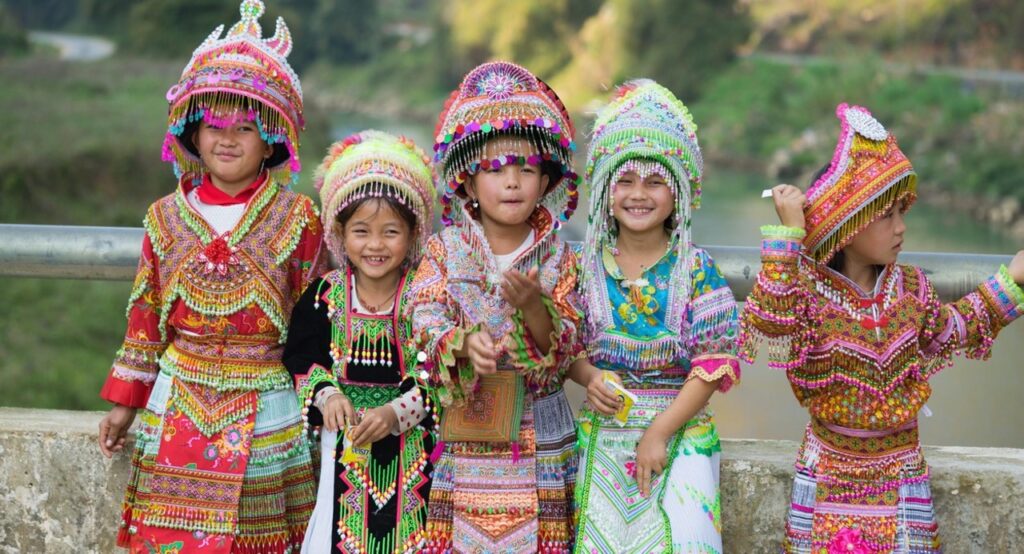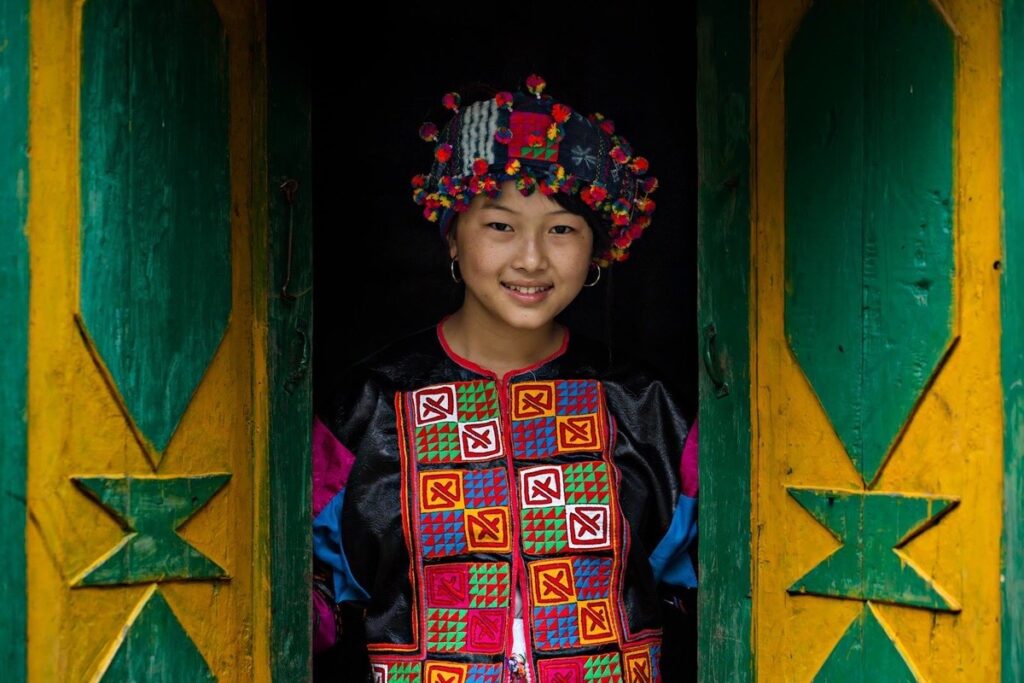Meet the authentic people in Vietnam, a land of breathtaking landscapes and rich cultural heritage. Beyond the bustling streets and tourist attractions lies a deeper layer of Vietnamese society—the diverse and authentic people. In this article, we embark on a journey to explore the intricacies of Vietnamese culture and the unique identities of its people.
Vietnamese Ethnic Groups

Vietnam is home to a remarkable diversity of ethnic groups, with 54 recognized communities contributing to the nation’s cultural tapestry. At the heart of this diversity lies the Kinh majority, comprising over 80% of the population. However, the mosaic of Vietnamese society extends far beyond the Kinh, encompassing numerous minority communities each with its distinct culture, traditions, and language.
Regional Variations in Vietnamese People

The characteristics of Vietnamese people vary significantly across different regions of the country.
In Northern Vietnam, a stronghold of tradition and Confucian values, people exhibit a deep respect for authority and uphold traditional crafts and practices.
On the other hand, Central Vietnam, particularly areas like Hue and Da Nang, boasts a strong sense of cultural pride and warm hospitality, rooted in the region’s historical significance.
In Southern Vietnam, a dynamic blend of Vietnamese, Chinese, and Khmer influences shapes the cultural landscape. Cities like Ho Chi Minh City, bustling with modernity and entrepreneurial spirit, stand as testaments to the region’s liberal outlook and vibrant energy.
Traditions of Vietnamese People

The traditions of Vietnamese people are deeply ingrained in everyday life, reflecting a profound reverence for ancestry and spiritual beliefs. Tet Nguyen Dan, or Lunar New Year, marks the most significant holiday in Vietnam—a time for family reunions, feasting, and paying respects to ancestors.
Ancestor worship holds a central place in Vietnamese culture, with families maintaining altars in their homes and making offerings to honour deceased relatives. Additionally, visits to pagodas, where Buddhists seek spiritual guidance and blessings, are common practices among the Vietnamese people.
Respect for elders is a cornerstone of Vietnamese society, with younger generations showing deference and filial piety to their parents and grandparents. Traditional festivals, characterized by colourful processions and communal activities, celebrate agricultural harvests, historical events, and local legends.
The quintessential attire of Vietnamese people, the “ao dai,” symbolizes elegance and grace and is worn on special occasions and formal events as a testament to the nation’s rich cultural heritage.
Languages Spoken by Vietnamese People
Vietnamese serves as the primary language spoken by most Vietnamese people, with its tonal nature adding complexity to communication. However, regional dialects such as Cantonese, Khmer, Hmong, Tay, and Muong are also spoken by various ethnic groups across the country.
Religion
Folk religions centred around the worship of ancestors, spirits, and deities, form the spiritual backbone of Vietnamese culture. These practices, deeply intertwined with everyday life, seek blessings, protection, and good fortune for individuals and communities. Alongside folk beliefs, Buddhism, Confucianism, Taoism, and Catholicism also hold significant influence in Vietnam.
Conclusion
In conclusion, the authentic people of Vietnam represent a mosaic of cultures, traditions, and identities that contribute to the nation’s vibrant tapestry. From the lush landscapes of the north to the bustling cities of the south, each region offers a unique glimpse into the soul of Vietnam—a land shaped by centuries of history, tradition, and resilience.
If you are ready to embark on the journey to explore Vietnamese culture, don’t hesitate to
contact us to tailor your best experience!
FAQs
- What makes Vietnamese culture unique? Vietnamese culture is unique due to its diverse ethnic groups, rich traditions, and a strong emphasis on family and community.
- How do Vietnamese people celebrate Tet Nguyen Dan? Tet Nguyen Dan is celebrated with family reunions, feasting, and paying respects to ancestors through rituals and offerings.
- What is the significance of the ao dai in Vietnamese culture? The ao dai is a traditional attire symbolizing elegance and grace, worn on special occasions as a testament to Vietnam’s cultural heritage.
- How important is respect for elders in Vietnamese society? Respect for elders is highly valued in Vietnamese society, with younger generations showing deference and filial piety to their parents and grandparents.
- What role do regional variations play in Vietnamese identity? Regional variations contribute to the diverse identities within Vietnamese society, shaping cultural practices, dialects, and outlooks across different regions.
 Vietnam is home to a remarkable diversity of ethnic groups, with 54 recognized communities contributing to the nation’s cultural tapestry. At the heart of this diversity lies the Kinh majority, comprising over 80% of the population. However, the mosaic of Vietnamese society extends far beyond the Kinh, encompassing numerous minority communities each with its distinct culture, traditions, and language.
Vietnam is home to a remarkable diversity of ethnic groups, with 54 recognized communities contributing to the nation’s cultural tapestry. At the heart of this diversity lies the Kinh majority, comprising over 80% of the population. However, the mosaic of Vietnamese society extends far beyond the Kinh, encompassing numerous minority communities each with its distinct culture, traditions, and language.
 The characteristics of Vietnamese people vary significantly across different regions of the country.
In Northern Vietnam, a stronghold of tradition and Confucian values, people exhibit a deep respect for authority and uphold traditional crafts and practices.
On the other hand, Central Vietnam, particularly areas like Hue and Da Nang, boasts a strong sense of cultural pride and warm hospitality, rooted in the region’s historical significance.
In Southern Vietnam, a dynamic blend of Vietnamese, Chinese, and Khmer influences shapes the cultural landscape. Cities like Ho Chi Minh City, bustling with modernity and entrepreneurial spirit, stand as testaments to the region’s liberal outlook and vibrant energy.
The characteristics of Vietnamese people vary significantly across different regions of the country.
In Northern Vietnam, a stronghold of tradition and Confucian values, people exhibit a deep respect for authority and uphold traditional crafts and practices.
On the other hand, Central Vietnam, particularly areas like Hue and Da Nang, boasts a strong sense of cultural pride and warm hospitality, rooted in the region’s historical significance.
In Southern Vietnam, a dynamic blend of Vietnamese, Chinese, and Khmer influences shapes the cultural landscape. Cities like Ho Chi Minh City, bustling with modernity and entrepreneurial spirit, stand as testaments to the region’s liberal outlook and vibrant energy.
 The traditions of Vietnamese people are deeply ingrained in everyday life, reflecting a profound reverence for ancestry and spiritual beliefs. Tet Nguyen Dan, or Lunar New Year, marks the most significant holiday in Vietnam—a time for family reunions, feasting, and paying respects to ancestors.
Ancestor worship holds a central place in Vietnamese culture, with families maintaining altars in their homes and making offerings to honour deceased relatives. Additionally, visits to pagodas, where Buddhists seek spiritual guidance and blessings, are common practices among the Vietnamese people.
Respect for elders is a cornerstone of Vietnamese society, with younger generations showing deference and filial piety to their parents and grandparents. Traditional festivals, characterized by colourful processions and communal activities, celebrate agricultural harvests, historical events, and local legends.
The quintessential attire of Vietnamese people, the “ao dai,” symbolizes elegance and grace and is worn on special occasions and formal events as a testament to the nation’s rich cultural heritage.
The traditions of Vietnamese people are deeply ingrained in everyday life, reflecting a profound reverence for ancestry and spiritual beliefs. Tet Nguyen Dan, or Lunar New Year, marks the most significant holiday in Vietnam—a time for family reunions, feasting, and paying respects to ancestors.
Ancestor worship holds a central place in Vietnamese culture, with families maintaining altars in their homes and making offerings to honour deceased relatives. Additionally, visits to pagodas, where Buddhists seek spiritual guidance and blessings, are common practices among the Vietnamese people.
Respect for elders is a cornerstone of Vietnamese society, with younger generations showing deference and filial piety to their parents and grandparents. Traditional festivals, characterized by colourful processions and communal activities, celebrate agricultural harvests, historical events, and local legends.
The quintessential attire of Vietnamese people, the “ao dai,” symbolizes elegance and grace and is worn on special occasions and formal events as a testament to the nation’s rich cultural heritage.
